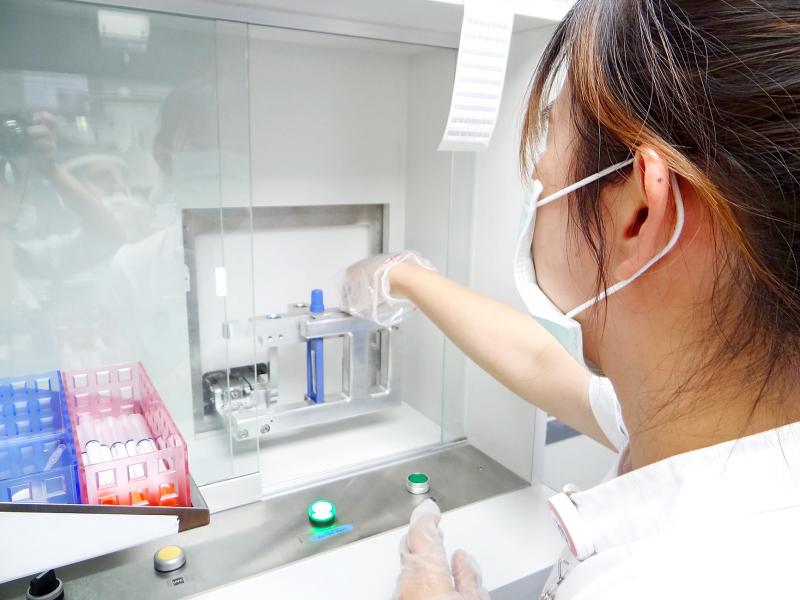Kim Forest Enterprise Co (金萬林), which focuses on molecular testing, yesterday reported that revenue last month doubled from a year earlier to a record NT$54.04 million (US$1.95 million) as domestic demand for COVID-19 testing rose amid an outbreak in Taiwan.
Almost half of the revenue was generated by a laboratory established to assist hospitals in Taipei with COVID-19 testing, as hospitals did not have enough staff to handle the rising number of polymerase chain reaction (PCR) tests, Kim Forest spokesman Vincent Yang (楊文明) told the Taipei Times by telephone.
Although samples must be collected by doctors or nurses, as the invasive process requires a long swab to be inserted into the subject’s nasal cavity, laboratory technologists can conduct certain steps including extracting samples and testing, Yang said.

Photo courtesy of Chi Mei Medical Center
As Kim Forest produces test kits for SARS-CoV-2 — which causes COVID-19 — supplies its own PCR machines and is an agent for foreign-made PCR machines, its labs have ample capacity to facilitate testing, he said.
“We can analyze up to 10,000 samples a day, which is more than is needed, as the maximum number of samples collected in Taipei in a day is about 2,000,” Yang said.
Kim Forest’s labs have worked with the government’s COVID-19 testing program and several private companies that paid to have their employees tested, with help from hospitals, he said.
Although the lab entity is not a company, Kim Forest owns it, so could still recognize the revenue into its consolidated figures, he said.
Twenty percent of last month’s revenue was from sales of detection kits, Yang said, adding that many hospitals purchased kits from the firm, as they have been granted emergency use authorization by the US Food and Drug Administration.
Moreover, its kits can be used with many styles of diagnosis machines, he said.
“The revenue structure is different from last year, when the main source of revenue was overseas sales of PCR machines,” Yang said. “Demand for kits and testing was lower last year, as the pandemic was relatively contained in Taiwan.”
Marketing activity for Kim Forest’s PCR machines was restricted, as staff could not easily visit hospitals or schools amid a level 3 alert, Yang said.
However, the company is confident that sales would pick up this year, as the Ministry of Health and Welfare has announced a subsidy of NT$5 million for each hospital assigned as a testing location.
In the first five months of this year, Kim Forest’s cumulative revenue grew 76.43 percent annually to NT$164 million, company data showed.

Intel Corp chief executive officer Lip-Bu Tan (陳立武) is expected to meet with Taiwanese suppliers next month in conjunction with the opening of the Computex Taipei trade show, supply chain sources said on Monday. The visit, the first for Tan to Taiwan since assuming his new post last month, would be aimed at enhancing Intel’s ties with suppliers in Taiwan as he attempts to help turn around the struggling US chipmaker, the sources said. Tan is to hold a banquet to celebrate Intel’s 40-year presence in Taiwan before Computex opens on May 20 and invite dozens of Taiwanese suppliers to exchange views

Application-specific integrated circuit designer Faraday Technology Corp (智原) yesterday said that although revenue this quarter would decline 30 percent from last quarter, it retained its full-year forecast of revenue growth of 100 percent. The company attributed the quarterly drop to a slowdown in customers’ production of chips using Faraday’s advanced packaging technology. The company is still confident about its revenue growth this year, given its strong “design-win” — or the projects it won to help customers design their chips, Faraday president Steve Wang (王國雍) told an online earnings conference. “The design-win this year is better than we expected. We believe we will win

Chizuko Kimura has become the first female sushi chef in the world to win a Michelin star, fulfilling a promise she made to her dying husband to continue his legacy. The 54-year-old Japanese chef regained the Michelin star her late husband, Shunei Kimura, won three years ago for their Sushi Shunei restaurant in Paris. For Shunei Kimura, the star was a dream come true. However, the joy was short-lived. He died from cancer just three months later in June 2022. He was 65. The following year, the restaurant in the heart of Montmartre lost its star rating. Chizuko Kimura insisted that the new star is still down

While China’s leaders use their economic and political might to fight US President Donald Trump’s trade war “to the end,” its army of social media soldiers are embarking on a more humorous campaign online. Trump’s tariff blitz has seen Washington and Beijing impose eye-watering duties on imports from the other, fanning a standoff between the economic superpowers that has sparked global recession fears and sent markets into a tailspin. Trump says his policy is a response to years of being “ripped off” by other countries and aims to bring manufacturing to the US, forcing companies to employ US workers. However, China’s online warriors